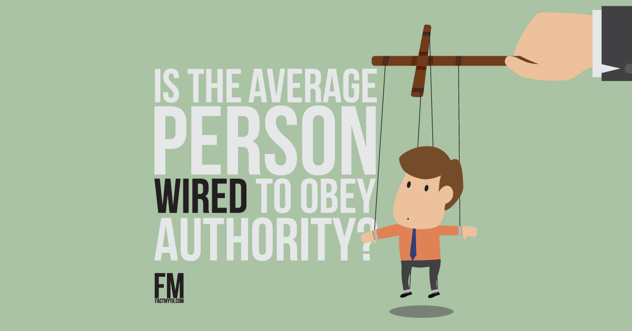
THE PERILS OF OBEDIENCE
It remains the most heinous crime in modern history. The Nazi genocide of six million European Jews during World War II was unsparingly barbaric and unfathomably evil. The state-sponsored mass murders were not carried out by Hitler himself, but by his trusted lieutenants. One of these henchmen was the notorious, Adolf Eichmann.
Eichmann was an SS Lieutenant Colonel and a key figure in the “Final Solution” – the Nazi plan to systematically eradicate the Jews of Europe from the human race. Eichmann was in charge of identifying, assembling, and transporting Jews to extermination camps in German-occupied Poland, including Auschwitz. As the architect of the Holocaust, Eichmann was effectively the chief executioner.
At the Nuremberg War Crimes trials (post World War II), he was charged with managing the mass deportation of Jews to killing centres. Eichmann’s defence – and that of other accused – was based on obedience. Eichmann claimed that he was just following orders from his Third Reich superiors. He portrayed himself as an unwilling accomplice, arguing that he was “forced to serve as a mere instrument” of the Nazi war machine.
In attempting to shift responsibility for the deaths of millions of Jews, Eichmann’s “obedience defence” helped spark the interest of Stanley Milgram, a Yale University psychologist, in the topic of obedience. In July 1961, at the same time that Eichmann was on trial, Milgram began a series of experiments focusing on the conflict between obedience to authority and personal conscience.
The fundamental aim of Milgram’s studies of obedience was to discover whether a person could be coerced into behaving heinously, like Eichmann. Specifically, Milgram tested whether “ordinary” folk would inflict harm on another person after following orders from an authority figure. Milgram dismayed the world when he revealed how easy it was to turn everyday people into torturers.
The volunteer participants recruited to the experiment were told that they were part of a study to investigate the effects of punishment on memory and learning ability. In reality, Milgram wanted to test how far his subjects (acting as “teachers”) would go in punishing other subjects (acting as “learners”) by administering potentially lethal electric shocks each time the learners made a mistake on a quiz*.
The teachers were instructed by a man in a white lab coat (the “experimenter” authority figure) to deliver a shock of increasing intensity to the learners after each incorrect answer. Unbeknown to the teachers, the learners were in fact undercover actors. The actors initially took the shocks silently but then screamed after each jolt even though the shocks were not real – Milgram had built a fake shock machine. Regardless, the teachers believed that the shocks were real.
Milgram proved that ordinary people could be induced to abandon their moral instincts by a malevolent authority. A high proportion of the teachers delivered electric shocks – they felt disconnected from their actions when complying with orders. The shocking conclusion (pun intended) from the Milgram experiment was that people obeying commands feel less responsible for their actions even though they are the ones committing the act.
Today, the Milgram experiment is criticised on both ethical and scientific grounds. Still, many psychologists argue that even with moral lapses and methodological holes, the basic finding of Milgram’s work still holds up. Indeed, it has been used to explain atrocities from the Holocaust to the Vietnam War’s My Lai massacre to the abuse of prisoners at Abu Ghraib.
In August, 1971 social psychologist Philip Zimbardo expanded upon Milgram’s research in to the psychology of obedience. Zimbardo, a former classmate of Milgram, wanted to investigate further the impact of situational variables on human behaviour by using a two-week simulation of the rigid and uneven power structure in prison environments.
Zimbardo set up a mock prison in the basement of the Stanford University psychology department. He assigned his participants to play the roles of either “inmates” or “guards”, with Zimbardo himself acting as the “prison warden”. The behaviour of all involved was so extreme that the study had to be discontinued after a mere six days.
Soon after the experiment began, the guards began utilising authoritarian techniques to gain the obedience of inmates who they humiliated and psychologically abused. The powerless prisoners, in turn, became submissive and accepted the abuse with little protest.
Like Milgram’s obedience experiment, Zimbardo’s Stanford Prison Experiment has become infamous and controversial for breaking ethical guidelines relating to the treatment of volunteers. Even so, the experiment demonstrated the power of roles and the way ordinary people can turn cruel under the wrong circumstances.
Many, if not all, of the greatest human atrocities have been described as “crimes of obedience”, according to scholars Herbert C. Kelman and V. Lee Hamilton in their 1990 book, Crimes of Obedience. The author’s initial impetus for researching and writing the book was provided by the trial of Lieutenant William Calley for crimes committed at the My Lai massacre, one of the most infamous atrocities of the Vietnam War.
During his court-martial, Calley used the Nuremberg defence – a “good soldier” simply “following orders” – to justify his premeditated murder of 22 villagers (infants, children, women, and old men), and the assault of a child of about two years of age. All the killings and the assault took place on 16 March, 1968. Calley’s plea was that he dutifully followed his captain’s order to kill everyone in My Lai.
Many Americans saw Calley as a scapegoat in the chain of command and during his trial he received more than 10,000 letters of support. Following his conviction, the White House was inundated with mail objecting to Calley’s conviction. He was sentenced to life in prison, but after just three years of lax house arrest on military bases, he was released on parole in 1974 following the intervention of President Richard Nixon who reduced his sentence.
Like the volunteers in the experiments conducted by Milgram and Zimbardo, Calley was a good and decent man. A TIME magazine reporter who got to know Calley said of him:
There was nothing about Rusty Calley, as he was called, that would make you say that he was an explosion waiting to happen. He didn’t have killer instincts. He didn’t love guns. None of that was the case. He was a young guy from South Florida who loved being around people and going to parties. He was fun to be around.
■ ■ ■
It’s clear that people can succumb to the demands of authority however immoral the consequences. Indeed, people have a propensity to obey the most abhorrent of orders – and not just on the battlefield. Obedience to authority is ingrained in all of us from an early age. Throughout our lives, we encounter authority figures to whom we are answerable and this plays out in key relationships such as between parent-child, teacher-student, boss-employee, priest-minor and so on.
Humans have a strong predisposition to obey authority and this is driven by a tendency to please authority figures. But when legitimate authority is abused, blind obedience to inappropriate orders can lead to destructive outcomes. Our challenge is to stand up against arbitrary or unjust authority and not allow another person to define for us what is right or wrong.
We all have a moral compass which guides our decision making and this can help us resist the urge to comply with commands that are at odds with our value system. As noted by the American Psychological Association:
Acquiescence to the commands of an authority that are only mildly objectionable is often, as in Milgram’s experiments, the beginning of a step-by-step, escalating process of entrapment. The farther one moves along the continuum of increasingly destructive acts, the harder it is to extract oneself from the commanding authority’s grip, because to do so is to confront the fact that the earlier acts of compliance were wrong.
In the business world, employees can sometimes face unethical demands from employers. Some bosses fail to provide appropriate moral leadership by encouraging unethical practices in the workplace in the interests of, say, improving the bottom line. With regard to corporate scandals, some white-collar criminals trace their downfall to an excessive obedience to authority.
It’s ironic that some of the greatest crimes in history have been committed by those who followed the rules, not by those who broke them. Blindly following orders can be a recipe for disaster, particularly when they conflict with common decency. While a civilised society needs rules, regulations, and policies, they should not be inviolable. In all walks of life, people must be allowed to use common sense and good judgment.
We must think for ourselves and resist malevolent orders.
*In one variant of Milgram’s experiment, 65 per cent of “teachers” went all the way in administering shocks, starting from 15 volts (labelled “slight shock” on the machine) and progressing to the maximum 450 volts (“Danger: severe shock”).
Regards
Paul J. Thomas
Chief Executive Officer
Ductus Consulting


Hello Paul,
This was a very compulsive read enabled by its fluency…..there must be a good sub editor in there somewhere!
I find the true nature of our species beguiling and sadistic to say the least.
I think that the climate and other species will be a lot better off without us!
Thank you,
Des